RT24 CPCS Blue Card Renewal Mock Test with 128 Questions and Answers / A24 Motorised Scraper
£15.00 Original price was: £15.00.£9.95Current price is: £9.95.
Get ready to ace your RT24 CPCS Blue Card renewal test with our realistic practice multiple-choice questions. They’re just like the actual NOCN/CPCS test, ensuring you’re fully prepared to renew your blue card with ease!
- Questions & Answers: based on the latest RT 24 Motorised Scraper – CPCS Renewal Test Revision FACTSHEET
- Categories: A 24 – Motorised Scraper
- Number of Multiple-choice Questions: 128
- Format: PDF
- Delivery time: Instant download after checkout
- Refunds: No refunds once downloaded, unless you ordered duplicates by mistake.
If there are any issues with your download, please email CardRenewalTest@gmail.com and we’ll send it ASAP
Unlock Your Future: Pass the CPCS Blue Card Renewal Test with Confidence
Are you a dedicated Motorised Scraper operator holding a CPCS Blue Card that’s set to expire? Worried about the looming renewal test and the prospect of losing your livelihood? Fret not! We’ve got you covered with the ultimate solution – our RT24 Motorised Scraper CPCS Blue Card Renewal Mock Practice Test.
Why Do You Need These Mock Questions?
1. CPCS Blue Card Renewal: A Vital Step
Your CPCS Blue Card signifies your competency as a Motorised Scraper operator. It’s your ticket to a flourishing career in construction and civil engineering. However, it’s not a lifetime ticket; it comes with an expiry date. As your card approaches its expiration, you need to renew it to stay in the game.
2. The Renewal Test Challenge
The CPCS Blue Card Renewal test is no walk in the park. It’s designed to ensure you’re up to date with the latest industry knowledge, safety regulations, and best practices. Whether you’ve taken it before or you’re gearing up for your first renewal, the pressure is real.
3. Renewal Test Stress
Reading through large chunks of text from the factsheet can be overwhelming. The pressure of the test can make it hard to focus and absorb the essential information. And, as you may already know, failing the test can set you back and put your career on hold.
What Will You Learn?
- Real-Life Scenario Questions: Our mock practice test is based on the latest NOCN CPCS RT24 Motorised Scraper factsheet, mirroring real-world scenarios you’ll encounter in the field.
- Comprehensive Coverage: We’ve compiled 128 multiple-choice questions that address a wide array of topics crucial for passing the renewal test, from safety measures to operating procedures.
- Increased Confidence: Practicing with our mock questions will boost your confidence. You’ll feel more at ease with the format and content of the actual test.
- Stay Up to Date: The construction industry evolves. Renewing your CPCS Blue Card ensures you’re aware of the latest developments, best practices, and safety protocols.
How to Pass the CPCS Blue Card Renewal Test
- Study the Factsheet: Start by thoroughly reading the NOCN CPCS RT24 Motorised Scraper factsheet. This will provide you with the foundational knowledge you need.
- Practice with Mock Questions: Use our RT24 Motorised Scraper CPCS Blue Card Renewal Mock Practice Test to apply what you’ve learned. Practice is the key to success.
- Master the Questions: Review the questions and answers until you know them like the back of your hand. Understanding the material is crucial.
- Stay Calm and Confident: On the day of the renewal test, take a deep breath, and remember: you’ve got this. You’ve prepared, you’re informed, and you’re ready to show your competence.
The Benefits of Our Mock Practice Test
- Convenience: Access the mock test whenever and wherever you want, on your schedule.
- Efficiency: Learn and practice at your own pace without the stress of a looming deadline.
- Accuracy: Our questions are based on the latest factsheet, ensuring you’re well-prepared for the real test.
- Confidence Building: The more you practice, the more confident you become, and the higher your chances of success.
- Career Security: Passing the renewal test means you can continue working as a Motorised Scraper operator, securing your livelihood.
Don’t leave your career to chance. Renew your CPCS Blue Card with confidence using our RT24 Motorised Scraper CPCS Blue Card Renewal Mock Practice Test. Extend your Blue Card for another 5 years and unlock a bright future in construction and civil engineering. Don’t let your card expire—secure your tomorrow today.
Here are the summarized learning points from the official RT 24 Motorised Scraper factsheet:
Preparation
- Motorised scrapers, once common in civil engineering projects for bulk earthmoving, are still used for various cut and fill operations.
- Scraper operators should be aware of issues related to their size, weight, visibility limitations, stability, efficient working, and working with others.
- Pre-use checks, conforming to manufacturer requirements, must be carried out to prevent accidents and component failures.
- Even minor faults should be reported and expert advice sought, as they may worsen or be significant but not visible.
- Reversing accidents are significant in the workplace; scrapers should have functioning reversing warning systems.
- Regular cleaning of cab glass is essential due to limited visibility and working conditions.
- Safety measures should be in place for tasks that require climbing onto the machine.
- Specific scraper types may be specified for certain operations, offering advantages like self-loading for elevating types.
Working with Others (Procedures)
- Scrapers need efficient loading methods, including the use of pusher tractors or working in tandem with other scrapers.
- Single engine units with pusher tractors should keep engine speed low to minimize tire spin.
- Twin-engine units with pusher tractors should have the rear engine at idle speed and receive loading position indications.
- Tandem self-loading procedures include using both engines on the first scraper and only the front engine on the second.
Working Safely and Efficiently (Working Tasks)
- Operators should consider whole-body vibration over extended work periods, and cabs are designed to minimize vibration.
- Properly adjusted suspended operator seats reduce vibration and harsh movements.
- Scrapers can have cushion hitches to minimize shock loading while traveling, which should be deactivated during cutting.
- Travel routes should consider pedestrian movement and adapt to changing ground conditions, particularly in wet weather.
- Safety measures include providing barriers to prevent machines from going over edges.
- Roll-over protective structures (ROPS) should be present, but wearing a seatbelt is crucial for safety.
- Switching off the engine when exiting the cab prevents unintended movement.
- Safety protocols and manufacturer stipulations for working on inclines should be followed to prevent instability and overturns.
- Excessive steering and sharp turns, especially when loaded, can cause instability.
- Adequate distance from overhead power lines should be maintained to avoid arcing.
- Efficient loading is essential to minimize wear and maintain efficient operation.
- Scraper operators should evenly distribute their machine’s load to avoid rutting and damage during embankment construction.
- Parking on sloping ground should be avoided. If unavoidable, safety measures include applying the parking brake, placing the transmission in neutral, and using wheel chocks.
Stability and Visibility (Stability)
- Reducing reversing incidents is the primary method for avoiding accidents.
- If reversing cannot be eliminated, measures should be taken to reduce reversing and limit operations to controlled areas.
- Vision aids, such as mirrors and CCTV systems, can help improve visibility but may have limitations.
- Carrying heavy loads higher on the scraper reduces stability, especially on inclines and gradients.
- Keeping the bowl too high while traveling can lead to instability and rolling.
- On inclines, turning uphill can cause instability, making an inside wheel lift.
Be the first to review “RT24 CPCS Blue Card Renewal Mock Test with 128 Questions and Answers / A24 Motorised Scraper” Cancel reply
Related products
CPCS Blue Card Renewal Tests
RT19 CPCS Blue Card Renewal Mock Test with 123 Questions and Answers / A19 Grader
CPCS Blue Card Renewal Tests
CPCS Blue Card Renewal Tests
RT45 CPCS Blue Card Renewal Mock Test with 110 Questions and Answers / A 45,46,47,48 Piling Rig
CPCS Blue Card Renewal Tests
RT40 CPCS Blue Card Renewal Mock Test with 139 Questions and Answers / A40 Slinger Signaller
CPCS Blue Card Renewal Tests
RT22 CPCS Blue Card Renewal Mock Test with 144 Questions and Answers / A22 Tracked Loading Shovel
CPCS Blue Card Renewal Tests
RT50 CPCS Blue Card Renewal Mock Test with 141 Questions and Answers / A50 Loader Securer STGO
CPCS Blue Card Renewal Tests
CPCS Blue Card Renewal Tests
RT33 CPCS Blue Card Renewal Mock Test with 129 Questions and Answers / A33 Agricultural Tractor



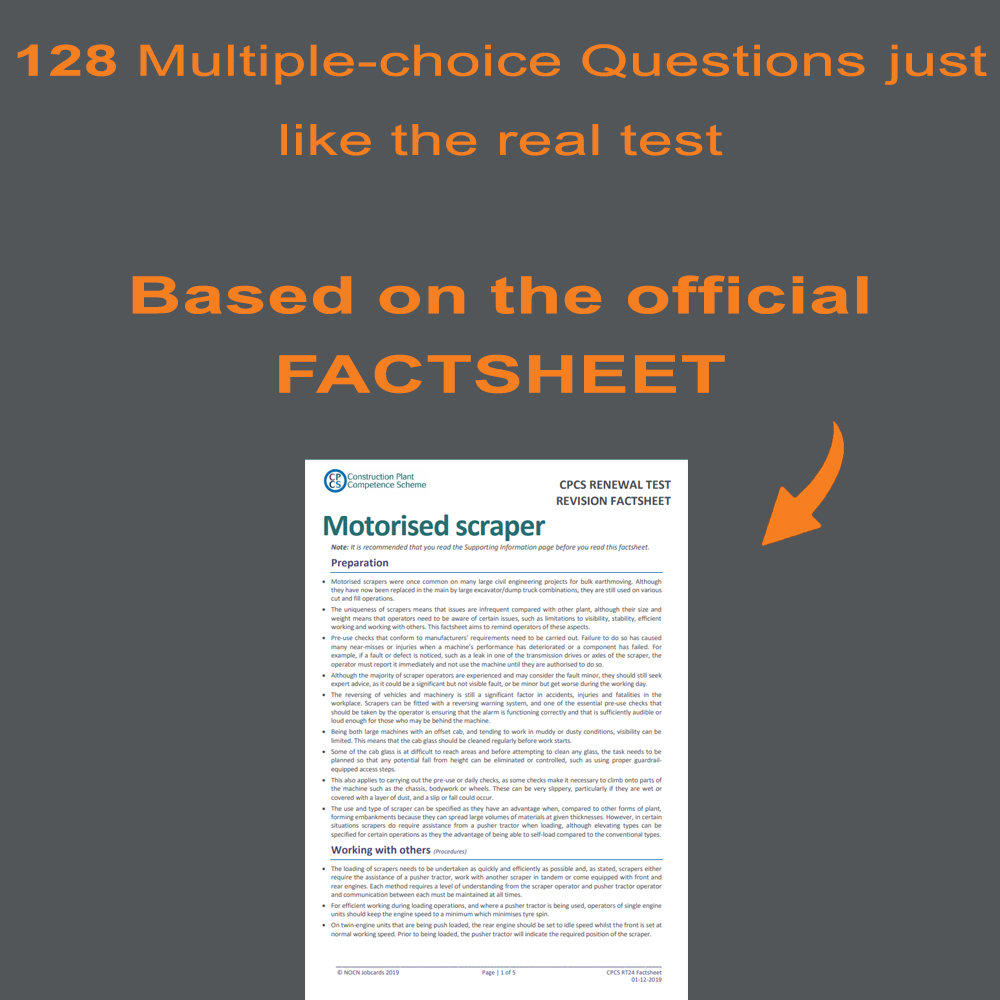


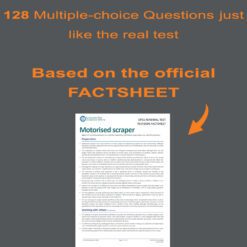
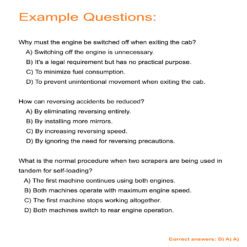




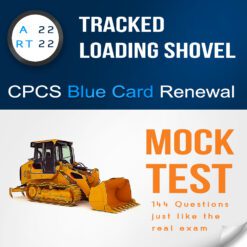

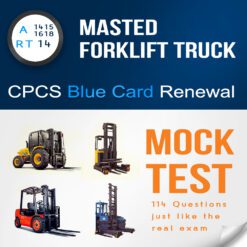
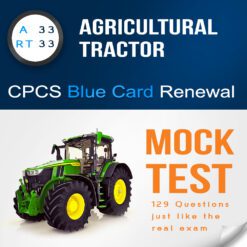
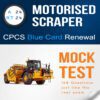
Reviews
There are no reviews yet.